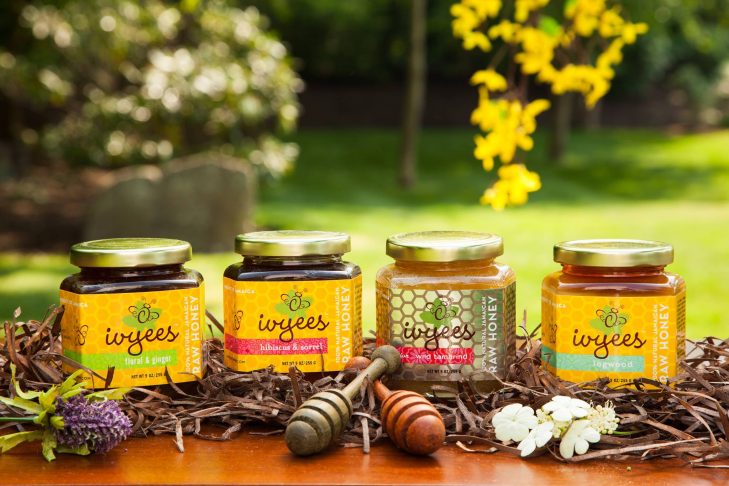“We are committed to providing a range of consumer products that are made with 100 percent natural raw honey. Our honey is from the pollination of exotic tropical bloomings, fruits and vegetables. Rich in vitamins, minerals and antioxidants, Ivyees brings you a healthier lifestyle.”
Ivy Lawson is owner and CEO of Ivyees Honey. She worked as an engineer in corporate America for two decades and then began a journey of study and change that gave wings to an entrepreneurship that was always present in her. The resulting company reflects her talents and skills as well as her values. Ivy attended the Temple Israel MLK Shabbat service in 2018 and is listed among the black-owned businesses we are highlighting for our members and friends as part of our Racial Justice Initiative’s focus on the business community. Temple Israel recently had the chance to engage a very busy Ivy, who is in the midst of a surge of interest in the company and its products.
How would you describe your business?

Ivyees Honey is a Boston-based company that is committed to providing a wide range of personal care, grooming and oral care products that are made with 100 percent raw honey and other natural and organic ingredients. Our product line includes raw honey, sold in Whole Foods, a shampoo and conditioner for any hair type, a detangler leave-in conditioner, moisturizing leave-in conditioner and an anti-humectant spray to keep the frizz away. Our face care products are made with New Zealand Manuka honey and include eye serum, anti-wrinkle creams and moisturizers. Finally, we offer a toothpaste that is made with natural ingredients.
What led you to start the company?
I became interested in bee-farming when a renowned entrepreneur in Boston introduced me to a group of bee farmers while on a trip to Jamaica. That inspired the hidden entrepreneurial spirit that I inherited from my maternal grandfather, who also farmed bees on the island. In 2007/2008 I made a life-changing decision to move my family to Jamaica, and I started my journey of becoming a bee farmer. I immersed myself in the study of bees and the production of raw honey. After learning of all the benefits raw honey provides not only to consume, but also when you expose yourself to it via products we use on a daily basis, I was inspired to do extensive research. I worked with chemists and other scientists to develop natural products for everyday use.
Where and how do you find your customers?
Word of mouth has been the best way to find customers. We do a lot of networking. We also belong to many business and entrepreneurial organizations. I spend a lot of time ensuring that my products are not only good for you, but they produce great results. I think once people start seeing the results, they are eager to share with others. We use social media to promote and advertise, but we also provide our customers with great education about the products. We just launched a blog page on our website, where our customers can read interesting facts about our products, which we hope will educate them on our concepts.
What are the biggest challenges?
I’m reminded often why being an entrepreneur is not for everyone. It takes a special kind of determination and drive to overcome the many challenges. Most small business owners, myself included, struggle with not having adequate funding to scale.
What kind of impression did the Temple Israel MLK service and reception make when you attended earlier this year?
I really enjoyed the program. The impression I got was that everyone was so friendly, and the inclusive spirit after the program ended made me think of all the times I took my sons to their classmates’ bar and bat mitzvahs. The kids and grown-ups just had fun.
What ideas do you suggest for how we can engage people in supporting entrepreneurs, in particular people of color who are starting and growing businesses?
I left corporate America at the height of my career. I actually loved my position at IBM. My career was going great. I left because I was tired of having to constantly prove my worth. Every promotion I’d ever gotten was a struggle to get. Not because I was not clearly deserving of it, but because I worked for people who did not value me as a qualified human being. I decided if I was going to work as hard as I worked, it would be for my own business. I focused on the idea that if I made great products without harsh, dangerous chemicals, consumers would buy them. Small businesses need support to grow. Even though African-Americans and especially African-American females are more likely to become entrepreneurs than any other group, they are highly favored to fail, partly because of lack of support from banks and consumers. My suggestion to help people of color grow their businesses is to believe they have the ability to produce great products that are beneficial to consumers. I know that a sure way to stay in business is to gain the confidence of your customers by providing great products.
As you know, Jewish tradition calls for apples and lots of honey around the celebration of the new year, Rosh Hashanah. Do you notice special interest in honey around that time?
Yes, definitely more sales during Rosh Hashanah and the day before Yom Kippur!
This post has been contributed by a third party. The opinions, facts and any media content are presented solely by the author, and JewishBoston assumes no responsibility for them. Want to add your voice to the conversation? Publish your own post here. MORE



